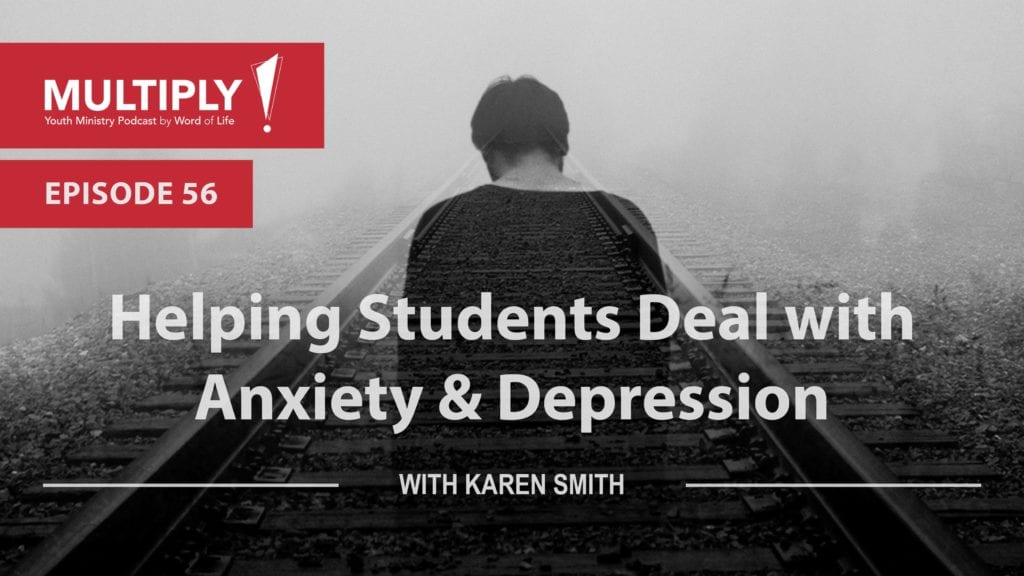If you have worked with students for more than a minute, you have dealt with the results of anxiety and depression. Students everywhere are struggling with it and many times with no help. Brian sits down with Karen Smith (a repeat guest from Episode 17), the Dean of women at the Word of Life Bible Institute and she gives us some practical steps as to how we can help students in these areas of struggle.
What are the leading causes of anxiety and depression in students today?
(Anxiety disorders have increased over 1200% since 1980.)
- Hyperconnected world: We have access to so much info that it is almost too much to process. We see disastrous news in real time, we self-diagnose ourselves with all the Medical information available, we focus on others’ lives, and we receive confusing messages through fake news and bullying.
- Self-gratification focus: We want to be in the know and we often play the comparison game, creating discontentment which Paul warns us against in 2 Corinthians. A focus on self-gratification also isolates us from the communities we need. We have less face-to-face, deep connections with each other. Family and other key relationships break down, leading to a lack of parental guidance and leadership. Family is important according to Scripture: One of the first things God did in Genesis was create the family, and in Psalms, God says He sets the lonely in families. Prov. 18:1 tells us that he who isolates himself will not respond in sound judgment.
- Loss of a moral compass: Morality is now free, relative and without absolutes.
All three causes create a loss of foundation and lead to uncertainty.
What does a student who is struggling with anxiety or depression need from me as a youth leader?
Anxiety is a lifelong and compounding issue. The student does not just grow out of it, so it needs to be dealt with. Listen! You may be the only one listening. You cannot discount how they are feeling. Look for common threads in how they feel and notice how they respond (ex. cutting, being withdrawn). Be willing to listen and not be shocked, but rather welcoming and loving. Ask good Questions. This helps them stop and process what they are feeling. For example, ask, “What are you feeling when…?” or “How do you see God in this?” Asking questions makes it conversational and draws out the heart of what is really going on. Pray: with them, for them, and follow up. Ask them what they are going to do towards fulfilling that prayer request so they are active in their own growth. Encourage them to be open and honest with their family. You as a leader should also work with the student’s family, so they will see the loving and united support behind them.
How do we point them to what is true, and help them line up their feelings with it?
Listen, empathize, and ask questions. This shows you respect them and their feelings, so they can respect you when you bring scripture into the conversation. Apply scripture to both their past hurts, and the lies they are believing. Students are dealing with big, hard things and we just want to be a part of helping them figure it out and work it through. Scripture is what brings truth and hope into the process.
What are some key Scriptures you take students to?
- Even the cliché passages work. The Holy Spirit still uses them.
- Prov. 3:5-6 – tells us to not lean on our own understanding, but to look outward and acknowledge what God says.
- Phil. 4:4-9 – remembering that “The Lord is near” is key.
- 1 Peter. 5:7-9 – we should cast our cares on him because he cares for us. Isolation is dangerous because it weakens us.
- 2 Tim. 1:7 – we want to live out of a spirit of power. No one wants to live out of fear.
- Psalm 27 – “of whom shall I fear?”
- Stick to the ones you know and have proven to help in your own life.
Encourage scripture memory, even of large passages. Focus on passages that help fight fear, but also on passages about the hope in the beauty of God and His promises. Scripture is a divine weapon. Anxiety is caused by meditation on the wrong thing. Meditating on scripture combats this.
Without a counseling degree, what can I do as a youth leader to help a student who is struggling, and at what point do we get more professional help?
- Listen, ask questions, and pray. This will also help you discern when to get more help. As an adult, you cannot agree to keep secret what the student is about to tell you. You should say something more like, “I will only tell those who can help in this situation,” so they know it will not become gossip, but that you will get help if they need it or are in danger.
- It is good to introduce or discuss their past health. The Bible should still be discussed, but students may also need to be physiologically checked out as part of the process. As it is with anyone, if you do not physically feel good, you will not tend to feel emotionally or mentally good.
- Also work with the parents or pastor if deeper counseling is needed. Go with them as their advocate, because seeking more help may be intimidating. You can be the extra comfort they need.
You may be able to have more of an impact than you think.
Wrap up final thought:
Have your student find a Psalm they can identify with and study it. Then have them write their own psalm. This is a great way to get them reading and interacting with Scripture.

